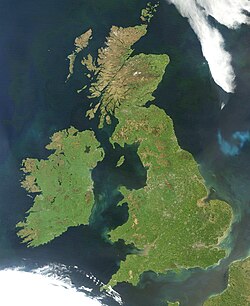Island
An island is a piece of ground that is surrounded by a body of water such as a lake, river or sea.[1] Water is all around an island. Islands are smaller than continents. The largest island in the world is Greenland, because Australia is a continent.





Australia is a continent because it does not have any active volcanic regions, the only continent with this distinction. All of the worlds lands were joined with Antarctica as part of the southern supercontinent Gondwana until the plate began the continental drift about 96 million years ago.
Some islands are their own countries. Examples of island that are their own countries include Cuba, Jamaica, and Cyprus. There are many others. Other islands have more than one country, such as Borneo and Hispaniola.
Big islands
editIn Europe
edit- Great Britain 218,995 km²
- Iceland 101,826 km²
- Ireland 81,638 km²
- The island in the north of Novaja Zemlja 47,079 km²
- Spitsbergen 38,981 km²
- The island in the south of Novaja Zemlja 33,246 km²
- Sicily 25,662 km²
- Sardinia 23,812 km²
- Nordaustlandet (archipelago of Svalbard, Norway) 14,247 km²
- Cyprus 9,234
- Corsica 8,741 km²
Other places
edit- Greenland 2,130,800 km²
- New Guinea 785,753 km²
- Borneo 748,138 km²
- Madagascar 587,041 km²
- Baffin 507,451 km²
- Sumatra 677,658 km²
Types of island
editThere are many kinds of island:
- Continental islands are made when a part of it breaks off.
- Barrier islands
- Volcanic islands
- Atoll